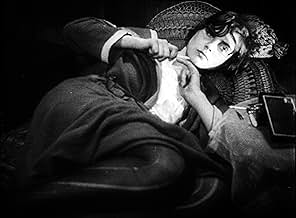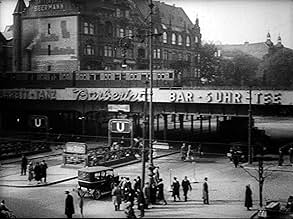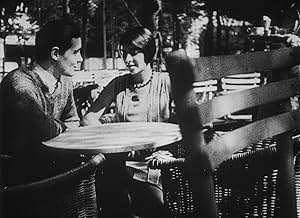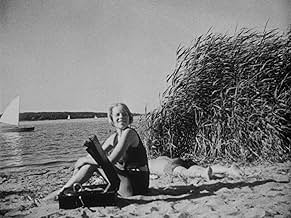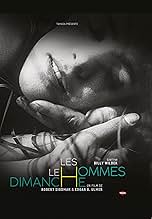VALUTAZIONE IMDb
7,3/10
3819
LA TUA VALUTAZIONE
Aggiungi una trama nella tua linguaTwo men and two women enjoy a pleasant Sunday at the beach amid the unending toil of the working week.Two men and two women enjoy a pleasant Sunday at the beach amid the unending toil of the working week.Two men and two women enjoy a pleasant Sunday at the beach amid the unending toil of the working week.
Kurt Gerron
- Self
- (non citato nei titoli originali)
Valeska Gert
- Self
- (non citato nei titoli originali)
Heinrich Gretler
- Self
- (non citato nei titoli originali)
Moriz Seeler
- Photo Subject at Beach
- (non citato nei titoli originali)
Ernö Verebes
- Self
- (non citato nei titoli originali)
Recensioni in evidenza
10tilmazio
Some of the people commenting on this movies mention the fact that it was made only three years before Hitler came to power. While this is true, it is a historical misunderstanding to think that in 1929, when the film was conceived and shot, Hitler was inevitably looming at the political horizon in Germany. In fact, in the Weimar republic of the late 20s there was good reason to believe, that the worst was over for Germany after the chaotic post-WWI-period. The economy had somewhat stabilized, the political circumstances were still chaotic, but I guess people had grown accustomed to the fact that the government changed every so often. Germany was not a democracy in the truest sense of the word, but there was a thriving lower-middle class, and that is what the people in the film are meant to represent. There was good reason to believe, that these people would be typical of Germany at this time. To think that the film makers were delusional about the true state of the German state is a judgement that comes out of knowing what happened later.
Thats what makes this film even more special in my thinking. It shows that there could have been potentially another Germany, and that fascism was not the inevitable consequence of the social condition in the early 30s, German national character or what so ever. In fact, I think thats why this master piece is not as well-known as it deserves to be. It does not fit the bill of 1920s Mabuse-style Germany, where Caligari was an early warning of the Nosferatu was the blue-print of a coming dictator etc, all this Kracauer stuff.
Having said that, I would like to point out two additional things about this film, that make it unique. First of all, with its on-location shot, its amateur actors and its next-to-nothing ,yet social realist story, it is a rare fore-runner of the post-war cinema of Italy etc, that has not acknowledged. (Then again, Rosselini et al never saw this film, but then again, where is the "neo" in "neo-realism" coming from.) It also seems to me that this might very likely be the first "indie" movie. "Indie" is of course a very vague term, and what is called "Independent cinema" differs greatly depending on where the critic is coming from. But I personally know of no other movie, that actually made it into the movie houses, that was produced by a handful of non-pros without the support of a studio. Of course, there are the surrealist films etc, but this was a reasonably successful film, not some art experiment. This is a very daring thesis, I know, but so far nobody was able to prove me wrong....
Thats what makes this film even more special in my thinking. It shows that there could have been potentially another Germany, and that fascism was not the inevitable consequence of the social condition in the early 30s, German national character or what so ever. In fact, I think thats why this master piece is not as well-known as it deserves to be. It does not fit the bill of 1920s Mabuse-style Germany, where Caligari was an early warning of the Nosferatu was the blue-print of a coming dictator etc, all this Kracauer stuff.
Having said that, I would like to point out two additional things about this film, that make it unique. First of all, with its on-location shot, its amateur actors and its next-to-nothing ,yet social realist story, it is a rare fore-runner of the post-war cinema of Italy etc, that has not acknowledged. (Then again, Rosselini et al never saw this film, but then again, where is the "neo" in "neo-realism" coming from.) It also seems to me that this might very likely be the first "indie" movie. "Indie" is of course a very vague term, and what is called "Independent cinema" differs greatly depending on where the critic is coming from. But I personally know of no other movie, that actually made it into the movie houses, that was produced by a handful of non-pros without the support of a studio. Of course, there are the surrealist films etc, but this was a reasonably successful film, not some art experiment. This is a very daring thesis, I know, but so far nobody was able to prove me wrong....
Extraordinary and very simple silent film, put together by some of the most remarkable talents of Twentieth Century Cinema - just read those credits! Within a few years most of these people were in Hollywood, and Hitler had destroyed both the wonderful film industry they had helped build and the joyous Berlin that this film depicts.
The film tells the story of four strangers, two men and two women, enjoying a lazy Sunday by a lake in Berlin. Nothing much seems to happen, but there is a lot going on, as the four interact. There is innocence, the potential for love, the danger of sex, the force of jealousy and the pain of longing. And through it all is the joy of living!
Magnificently shot - largely in extreme close-up - the film allows us a glimpse of Berlin between the wars and it is sad to watch it with the knowledge of what was soon to be. It would have been impossible to make this film with dialogue - the words would have destroyed the nuance and the emotion. It reveals the power of silent cinema.
If the print you see is without a soundtrack, as mine was, then may I recommend playing the Essential Marlene Dietrich during the film. I did this and the combination was unforgettable.
The film tells the story of four strangers, two men and two women, enjoying a lazy Sunday by a lake in Berlin. Nothing much seems to happen, but there is a lot going on, as the four interact. There is innocence, the potential for love, the danger of sex, the force of jealousy and the pain of longing. And through it all is the joy of living!
Magnificently shot - largely in extreme close-up - the film allows us a glimpse of Berlin between the wars and it is sad to watch it with the knowledge of what was soon to be. It would have been impossible to make this film with dialogue - the words would have destroyed the nuance and the emotion. It reveals the power of silent cinema.
If the print you see is without a soundtrack, as mine was, then may I recommend playing the Essential Marlene Dietrich during the film. I did this and the combination was unforgettable.
On a Sunday, four young befriended people make an excursion to the lake Wannsee in Berlin to spend their free time in the sun with boat trips, bathing and flirting.
This low budget production demands to remain at the surface of everyday life and to show certain scenes, coincidences and trivialities of it. It is mostly interested in the details and shows the other side of the hectic, restless Berlin - the peace of a summerly Sunday. Here, the people are removed from the daily rush, and it is discernible how the makers agree with their protagonists. They celebrate the self-confidence of the young generation - which is not yet overshadowed by the big crisis at the beginning of the 1930s - and demonstrate the physical joy of life, the carefreeness and playfulness. The other side of this urban way of life is, which apparently only banks on superficialness and the momentary, promiscuity and the wounds coming from this, the harshness and the cold of changing feelings. It's cynically depicted in one long tracking shot over tree-tops (indicating symbolically sexual intercourse) that ends at a pile of thoughtlessly ditched trash.
This low budget production demands to remain at the surface of everyday life and to show certain scenes, coincidences and trivialities of it. It is mostly interested in the details and shows the other side of the hectic, restless Berlin - the peace of a summerly Sunday. Here, the people are removed from the daily rush, and it is discernible how the makers agree with their protagonists. They celebrate the self-confidence of the young generation - which is not yet overshadowed by the big crisis at the beginning of the 1930s - and demonstrate the physical joy of life, the carefreeness and playfulness. The other side of this urban way of life is, which apparently only banks on superficialness and the momentary, promiscuity and the wounds coming from this, the harshness and the cold of changing feelings. It's cynically depicted in one long tracking shot over tree-tops (indicating symbolically sexual intercourse) that ends at a pile of thoughtlessly ditched trash.
A German silent curio heralds several future magnates of the film industry in Hollywood, PEOPLE ON Sunday is the debut feature for both its directors Robert Siodmak and Edgar G. Ulmer, with a script from a tender-age Billy Wilder and Fred Zinnemann in the camera branch. It is a bracing urban symphony of Berlin during the interwar times, confining its time-frame within a weekend, convenes a cast of five non-professional young actors (who are essentially playing themselves) and blithely breaking the boundary of studio lot and taking the story onto the streets of the metropolis, from a rush-hour Behnhof Zoo train station near the beginning to the movie's main course, a Sunday outing in Wannasee.
The quintet are Erwin, a taxi driver, his model wife Annie, and his friend Wolfgang, a wine dealer, then Christl, a film extra Wolfgang accosts in the said train station and Brigitte, her friend, who works in a record shop. Throughout its simple plot structure, the narrative heartily proceeds with a bifurcating stratagem, a plump, honest-looking Erwin's squabble-plagued marital life with a languorous Annie in their pokey bedsit, contrasting with a louche Wolfgang's pat oscillation in wooing either Christl or Brigitte, furthermore, a tangible rift is wondrously evinced between the two flappers, Christl is the prim and proper type, who naturally spurns Wolfgang's advances in the well-orchestrated lake-swimming sequences, but when she notices that Wolfgang takes his offensive towards a more skittish Brigitte and the two become lovey-dovey, she can barely contain her pique, not only to Wolfgang, but also to her girlfriend.
Yet, what leaves the most piquant tang is a thoroughgoing embodiment of machismo by the two male creatures, Erwin is the off-limits married man, both girls give him a decent berth, humbled by a comparatively more good-looking and athletic Wolfgang, he knows his role very well, a sausage juggler for laughter, a cavalier company, completely forgets about Annie's absence when there are new girls around, but also seemingly attests that, when sex is off the table, girls are just girls, no further communication is worth his effort. Wolfgang is more or less more readable, cops a feel whenever he can find a chance but will not get his feet wet into a stable relationship, and if a girl becomes too pushy, there is always a Sunday football match he can attend with his buddy Erwin.
A lilting juvenilia robustly interpolates expressionistic portraiture and vignettes (there are some very impressive close-ups both in still and in motion should be attributed to the young but ingenious film crew) in all the larking and perambulating, PEOPLE ON Sunday can still turn heads not just as a chirpy comedy, but also, a counter-time escapist prose because unfortunately we cannot blot out the fact that something egregiously sinister was incubating in that touchy era and that particular country.
The quintet are Erwin, a taxi driver, his model wife Annie, and his friend Wolfgang, a wine dealer, then Christl, a film extra Wolfgang accosts in the said train station and Brigitte, her friend, who works in a record shop. Throughout its simple plot structure, the narrative heartily proceeds with a bifurcating stratagem, a plump, honest-looking Erwin's squabble-plagued marital life with a languorous Annie in their pokey bedsit, contrasting with a louche Wolfgang's pat oscillation in wooing either Christl or Brigitte, furthermore, a tangible rift is wondrously evinced between the two flappers, Christl is the prim and proper type, who naturally spurns Wolfgang's advances in the well-orchestrated lake-swimming sequences, but when she notices that Wolfgang takes his offensive towards a more skittish Brigitte and the two become lovey-dovey, she can barely contain her pique, not only to Wolfgang, but also to her girlfriend.
Yet, what leaves the most piquant tang is a thoroughgoing embodiment of machismo by the two male creatures, Erwin is the off-limits married man, both girls give him a decent berth, humbled by a comparatively more good-looking and athletic Wolfgang, he knows his role very well, a sausage juggler for laughter, a cavalier company, completely forgets about Annie's absence when there are new girls around, but also seemingly attests that, when sex is off the table, girls are just girls, no further communication is worth his effort. Wolfgang is more or less more readable, cops a feel whenever he can find a chance but will not get his feet wet into a stable relationship, and if a girl becomes too pushy, there is always a Sunday football match he can attend with his buddy Erwin.
A lilting juvenilia robustly interpolates expressionistic portraiture and vignettes (there are some very impressive close-ups both in still and in motion should be attributed to the young but ingenious film crew) in all the larking and perambulating, PEOPLE ON Sunday can still turn heads not just as a chirpy comedy, but also, a counter-time escapist prose because unfortunately we cannot blot out the fact that something egregiously sinister was incubating in that touchy era and that particular country.
One of the surprising things about this film is the very acute, naturalistic and fundamentally humorous performances from an amateur cast, lacking all the usual strange, exaggerated mannerisms of silent cinema. The other impressive aspect of the film is the beauty of the photography, always playful and probing: the scene where an old man responds to the pompous nationalistic statues in the park is brilliant and affecting, if rather ambiguous. The modern score that was provided in the version I saw was effective and fitting: to be recommended. I agree that it all seems rather unreal, given that it takes place in 1929- yet it strikes me as not so much realistic, as naturalistic: perhaps striving to depict normality in difficult times. A very good and fundamentally humane film, lacking any real plot or suspense, but full of really interesting moments.
Lo sapevi?
- QuizThe film was a major hit when it was released in Germany in 1930. Five of the people who worked on the film went on to direct films in Hollywood: Curt Siodmak, his brother Robert Siodmak, Edgar G. Ulmer, Fred Zinnemann, and Billy Wilder.
- BlooperWhen the movie star picture cards are torn off the wall, the number of cards still on the wall constantly changes. Sometimes more cards are still on the wall than in the shot before, etc.
- ConnessioniFeatured in Histoire(s) du cinéma: Toutes les histoires (1988)
I più visti
Accedi per valutare e creare un elenco di titoli salvati per ottenere consigli personalizzati
- How long is People on Sunday?Powered by Alexa
Dettagli
- Tempo di esecuzione
- 1h 13min(73 min)
- Colore
- Mix di suoni
- Proporzioni
- 1.20 : 1
Contribuisci a questa pagina
Suggerisci una modifica o aggiungi i contenuti mancanti


